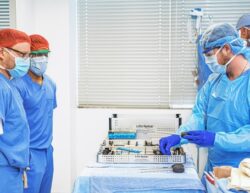Hiring managers in the medical sales industry are looking for enthusiastic, prepared and productive sales reps. The biggest mistake that you can make in a medical sales interview is to miss the opportunity to demonstrate that you are passionate about sales, that you will exceed expectations, and you can show your true self. A vast majority of hiring managers are looking to see if you have “it”.
Companies want to know that you can establish rapport, engage in productive conversation and develop relationships. They want to ensure you understand the sales cycle, that you are prepared to be actively involved each day, and that you are capable of building a territory to achieve revenue goals. You must be prepared with an action plan that explains how you will make a valuable contribution to their team compared to other applicants.
At Medical Sales College, we have spent over a decade preparing graduates to start their careers in the medical sales industry. Here are a few “Dos” and “Don’ts” that we think will set you apart from other candidates in an interview.
The “Dos” and “Don’ts” of a Medical Sales Interview:
1. DO spend time researching the company and the hiring manager.
Preparation is often overlooked. Review the company website in depth, identify primary products of the company and understand the corporate culture. Having conversations about these topics can show your motivation and interest in the company as a whole.
The hiring manager has many connections. Learn what you can about the person you will be interviewing with. LinkedIn and Google can be great resources. We encourage you to even connect with them on LinkedIn a day or two before the interview as well.
2. DO research the territory and understand the competition.
Some basic questions to ask yourself when doing this research: What companies or products have strong market share or representation in the territory? Which surgeons are using the company’s products and which are using competitive products?
The hiring manager may ask these questions, and if they don’t, you will be prepared to discuss topics that they will find important to the job. Understanding the territory and competition shows that you took initiative and are dedicated to the industry even before being hired.
At Medical Sales College, students and alumni have access to our proprietary MDRepTrack software that is specifically built for the medical sales industry. They can create their own encyclopedia of vocabulary, procedures, products, publications, and educational videos to use as an ongoing resource throughout their career. With this information all in one place, they are able to define their territory, target surgeons, profile hospitals/facilities, analyze competitive products, and create impactful sales calls. Learn more about our programs here.
3. DO practice your presentation.
We all know the adage “practice makes perfect.” That applies to your interview as well. The interview is your opportunity to present yourself and make a great first impression. Take time to identify the most likely interview questions and practice answering them out loud. Stand in front of a mirror, or in front of a family member or friend, and practice. Saying your answers aloud will help enforce key points you want to highlight and calm your nerves when it comes time for the live interview.
4. DO have at least two copies of a professional resume prepared.
You never know what could happen. Having two copies of your professional resume specific to your medical sales position will help make you more prepared and limit your stress.
We wrote an entire article on building a strong, professional medical sales resume to prepare you for this interview. Click here to learn more.
5. DO arrive early.
Keep in mind: 10 minutes early is on time, being on time is late, being late is inexcusable.
There is no excuse for arriving late to an interview. You should be near the interview site 15-20 minutes early. That does not mean being in the building that early is okay. Being 10 minutes early to an interview seems to be the sweet spot for hiring managers. This shows that you are prepared, but not rushing the interviewer.
If there are other candidates interviewing before you, or if the hiring manager is busy before your designated time, just be patient. They will get to you when they are ready. Sit and take this time to prepare for your interview.
6. DO dress professionally.
In an interview, you are being judged on everything, from your skillset, to the way you present yourself. What you wear says a lot about your professionalism. Be prepared to wear a business suit and to dress conservatively. Portraying a professional appearance is very important in the medical sales industry, and therefore critical for your interview.
7. DO make a connection with the hiring manager and engage them in conversation.
Being able to establish a relationship quickly is important. This does not give you permission for too much “small talk” – your message still must be a substantive one. Do what you can to direct the conversation, while still respecting the hiring manager’s interviewing style.
Taking the initiative to guide the conversation gives you an advantage. It shows that you are present and genuinely interested in the position you are applying for. Find ways to connect to your hiring manager without losing focus of the interview. You want to be remembered. What will remind the interviewer of you?
8. DO be prepared to ask appropriate questions.
During interviews, there is often a time to ask questions. Preparing for this will help you stand out from the rest of the interviewees. Develop a list of questions before you get to the interview. This can be basic information about the company, industry or position.
Also, listen carefully during the interview and identify “hot buttons” that you can come back to later. It is important to clarify any potential misunderstandings you may have during the interview.
9. DO get a business card from the hiring manager so that you can follow up.
Follow up with a thank-you email the same day. Go a step further by sending a handwritten card soon after. A handwritten letter will not get lost in an email inbox, and is an effective way to stand out in the digital age. This will show your excitement for the position and remind the hiring manager of your name.
10. DO CLOSE THE INTERVIEW!
Interviewees that do not close, do not get a second chance. Get outside your comfort zone and ask about the next steps to the interview process, or even for the job. If you are afraid to ask for the job or for the next steps, it is perceived that you will likely not ask for the business if put in a sales position. In the medical sales industry, this is a huge part of the interview process and can either make or break your chances of landing the job.
The “Don’ts” of a Medical Sales Interview:
1. DON’T ask the hiring manager too many questions prior to the interview.
Be resourceful and prepare for the interview independently. Asking too many questions before the interview can be frustrating for the hiring manager. They are dealing with a number of other applicants, and you are not their sole focus. You don’t want to come off as too eager or desperate.
2. DON’T display hesitancy in any way.
Your job during the interview is to sell yourself to the employer. It is not the time to determine if the job is the perfect fit for you. Don’t overthink it and take this opportunity to focus on promoting yourself and your abilities.
3. DON’T allow the interview to become an “Ask and Answer” session.
You should use the interview opportunity to discuss your qualifications, your fit for the organization, and how you will contribute to the team. Think “Show and Tell” instead of “Q&A.”
4. DON’T get discouraged.
A hiring manager might test you to see how you handle rejection and/or criticism. Be collected and confident, even if you feel the interview is not going well. This could be a make or break tactic for the interviewer. Breathe and be yourself.
5. DON’T be too casual.
A hiring manager may be dressed in scrubs and give you the indication that it is a comfortable, casual environment. Don’t lose sight of the fact that you are a professional aspiring to be a medical sales representative. Be sure that you present like one.


















